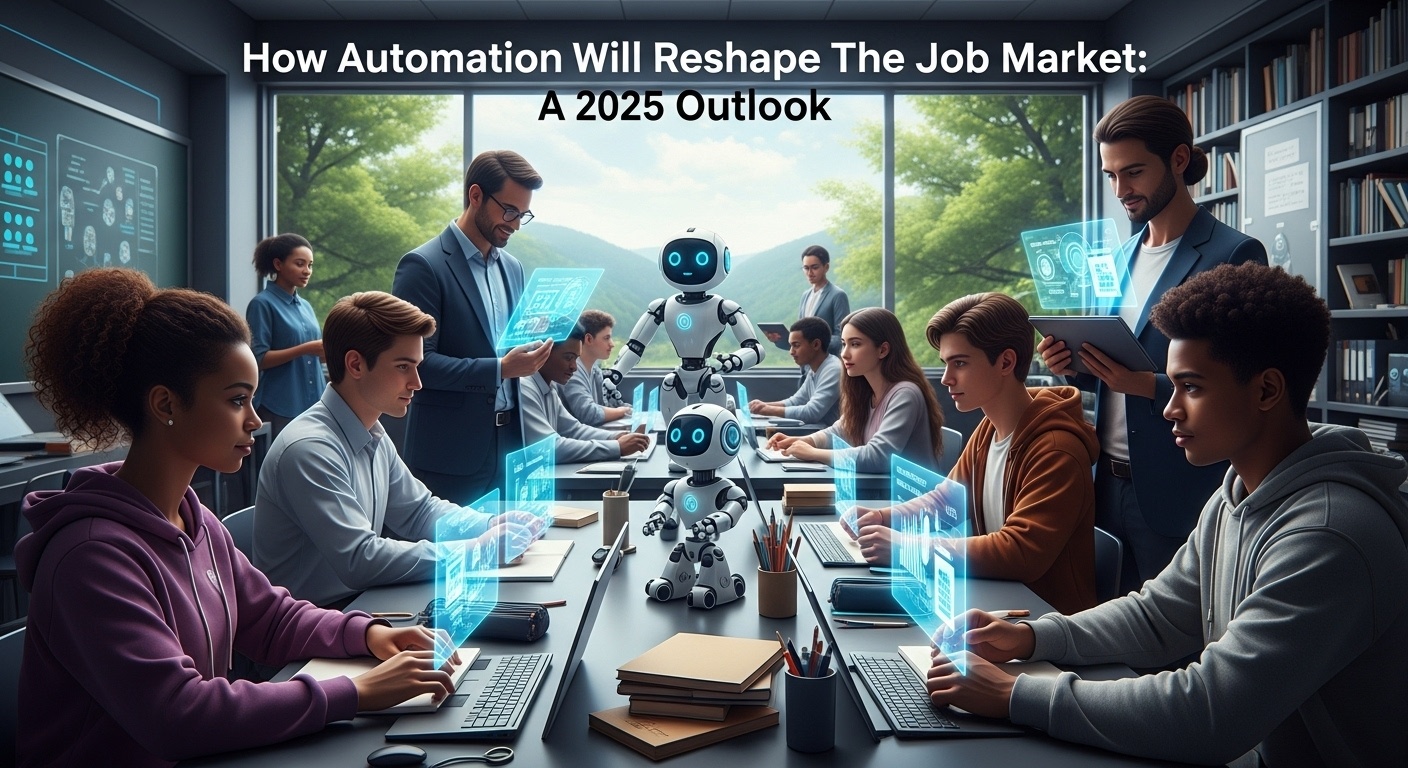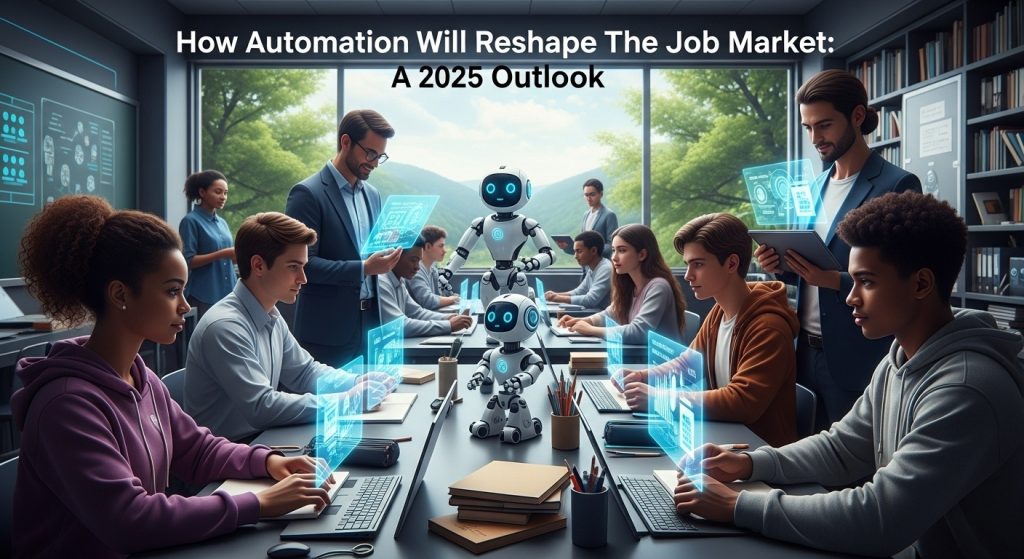By 2025, the whispers of automation will become a roar, significantly altering the job market landscape. Imagine AI-powered platforms autonomously managing supply chains, optimizing logistics with near-perfect efficiency. Even composing initial drafts of legal documents. While some fear widespread displacement, the reality is more nuanced. Recent advancements in robotic process automation (RPA) have already streamlined data entry and customer service tasks, freeing human employees for higher-level strategic thinking and creative problem-solving. This shift necessitates a proactive approach: upskilling initiatives focused on AI collaboration, data analysis. Complex communication will be crucial for navigating this evolving terrain and capitalizing on the new opportunities that automation inevitably creates. Are you ready to grasp the transformations ahead?

Understanding the Automation Landscape in 2025
Automation, in its simplest form, is the use of technology to perform tasks with minimal human assistance. By 2025, we’ll see automation powered by a potent mix of technologies:
- Artificial Intelligence (AI)
- Robotic Process Automation (RPA)
- The Internet of Things (IoT)
- Cloud Computing
AI, particularly machine learning (ML), enables systems to learn from data and improve performance without explicit programming. This powers everything from customer service chatbots to complex predictive analytics.
RPA involves using software “robots” to automate repetitive, rule-based tasks. Think of automating invoice processing, data entry, or report generation.
IoT connects physical devices to the internet, allowing them to collect and exchange data. This data can then be used to automate processes and optimize operations in various industries.
Cloud computing provides the infrastructure and platform for automation technologies to operate at scale. It offers flexibility, scalability. Cost-effectiveness.
These technologies are not mutually exclusive. They often work together to create powerful automation solutions. For instance, AI can be used to enhance RPA by enabling robots to handle more complex and unstructured tasks.
The Impact on Job Roles: Creation, Transformation. Displacement
The narrative around automation is often framed as a story of job displacement. The reality is more nuanced. While some jobs will undoubtedly be eliminated, automation will also create new jobs and transform existing ones. Here’s a breakdown:
- Job Creation
- Job Transformation
- Job Displacement
Automation will fuel demand for roles related to developing, implementing. Maintaining automation systems. This includes AI engineers, RPA developers, data scientists, cloud architects. Cybersecurity specialists. The need for skilled professionals from top-tier Computer Science Colleges will be higher than ever.
Many existing jobs will evolve as automation takes over routine tasks. Workers will need to focus on higher-level skills such as critical thinking, problem-solving, creativity. Communication. For example, a customer service representative might spend less time answering basic inquiries and more time resolving complex customer issues.
Jobs that involve repetitive, manual. Rule-based tasks are most vulnerable to automation. This includes data entry clerks, assembly line workers. Some administrative roles. But, even in these cases, retraining and upskilling can help workers transition to new roles.
A key factor influencing the net impact on employment will be the pace of automation adoption and the effectiveness of workforce development programs.
Industries at the Forefront of Automation
Several industries are leading the charge in automation, driven by the potential for increased efficiency, reduced costs. Improved customer experiences:
- Manufacturing
- Healthcare
- Finance
- Retail
- Transportation
Automation has been a staple in manufacturing for decades. Advancements in robotics and AI are taking it to the next level. We’re seeing increased use of collaborative robots (cobots) that work alongside human workers, as well as AI-powered systems for quality control and predictive maintenance.
Automation is transforming healthcare through applications such as robotic surgery, automated dispensing of medications. AI-powered diagnostics. These technologies can improve patient outcomes, reduce medical errors. Free up healthcare professionals to focus on patient care.
The finance industry is leveraging automation for tasks such as fraud detection, risk management. Algorithmic trading. RPA is also widely used to automate back-office processes and improve operational efficiency.
Automation is revolutionizing the retail experience through self-checkout kiosks, automated inventory management. Personalized recommendations. E-commerce companies are also using automation to optimize logistics and delivery operations.
Self-driving vehicles are perhaps the most visible example of automation in transportation. But, automation is also being used to optimize logistics, improve traffic flow. Enhance safety in various modes of transportation.
Skills in Demand for the Automated Future
To thrive in the automated future, workers will need to develop a new set of skills. These skills can be broadly categorized into technical skills and soft skills:
- Technical Skills
- AI and Machine Learning
- RPA Development
- Data Analytics
- Cloud Computing
- Cybersecurity
- Soft Skills
- Critical Thinking
- Problem-Solving
- Creativity
- Communication
- Adaptability
Understanding the fundamentals of AI and ML is crucial for developing and deploying automation solutions.
Proficiency in RPA tools and platforms is essential for automating business processes.
The ability to review data and extract insights is critical for optimizing automation systems.
Familiarity with cloud platforms and services is necessary for deploying and managing automation solutions at scale.
As automation systems become more interconnected, cybersecurity skills are essential for protecting them from cyber threats. The curriculum in prominent Computer Science Colleges often includes cybersecurity studies.
The ability to review details, identify problems. Develop solutions is crucial for navigating the complexities of automation.
Automation systems are not perfect. Workers will need to be able to troubleshoot issues and find creative solutions.
The ability to generate new ideas and approaches is essential for adapting to the changing demands of the workplace.
Effective communication skills are necessary for collaborating with colleagues, communicating with stakeholders. Explaining complex technical concepts.
The ability to learn new skills and adapt to changing circumstances is crucial for staying relevant in the automated future.
Navigating the Transition: Strategies for Individuals and Organizations
The transition to an automated future requires a proactive approach from both individuals and organizations:
- For Individuals
- Invest in Upskilling and Reskilling
- Focus on Developing Soft Skills
- Stay Informed
- Embrace Lifelong Learning
- For Organizations
- Invest in Workforce Development
- Foster a Culture of Innovation
- Provide Career Transition Support
- Communicate Transparently
- Partner with Educational Institutions
Take courses, attend workshops. Pursue certifications to develop in-demand skills. Online learning platforms offer a wide range of courses on topics such as AI, RPA. Data analytics.
Participate in training programs and workshops to improve your critical thinking, problem-solving, creativity. Communication skills.
Keep up with the latest trends in automation and technology by reading industry publications, attending conferences. Networking with professionals in the field.
Be prepared to continuously learn new skills and adapt to changing circumstances throughout your career.
Provide training and development opportunities for employees to learn new skills and adapt to changing roles.
Encourage employees to experiment with new technologies and find ways to automate tasks and processes.
Offer support to employees who are displaced by automation, such as career counseling, retraining programs. Job placement assistance.
Be open and honest with employees about the impact of automation on their jobs and the company’s plans for the future.
Collaborate with universities and colleges, especially those specializing in computer science, to develop training programs that meet the evolving needs of the workforce.
Real-World Applications and Use Cases
Here are some concrete examples of how automation is being applied in various industries:
- Automated Customer Service
- Robotic Warehousing
- AI-Powered Diagnostics
- Automated Financial Analysis
Chatbots powered by AI are used to handle customer inquiries, provide support. Resolve issues. This frees up human agents to focus on more complex and sensitive cases.
Robots are used in warehouses to pick, pack. Ship orders. This increases efficiency, reduces errors. Improves order fulfillment times.
AI algorithms are used to review medical images and detect diseases such as cancer. This can improve the accuracy and speed of diagnosis, leading to better patient outcomes.
AI and ML are used to assess financial data, identify trends. Detect fraud. This helps financial institutions make better decisions and manage risk more effectively.
Case Study: RPA in Accounts Payable
A large manufacturing company implemented RPA to automate its accounts payable process. Previously, the process involved manual data entry, invoice matching. Payment processing. By implementing RPA, the company was able to automate these tasks, reducing processing time by 50% and eliminating errors. This freed up accounts payable staff to focus on more strategic tasks, such as vendor relationship management and financial analysis.
Ethical Considerations and Challenges
While automation offers many benefits, it also raises ethical considerations and challenges that need to be addressed:
- Bias in AI
- Job Displacement
- Privacy Concerns
- Security Risks
AI algorithms can perpetuate and amplify existing biases in data, leading to unfair or discriminatory outcomes. It’s crucial to ensure that AI systems are trained on diverse and representative datasets and that they are regularly audited for bias.
As noted before, automation can lead to job displacement, which can have significant social and economic consequences. It’s crucial to provide support for displaced workers and invest in workforce development programs to help them transition to new roles.
Automation systems often collect and process large amounts of data, raising privacy concerns. It’s essential to ensure that data is collected and used ethically and responsibly and that individuals have control over their data.
Automation systems can be vulnerable to cyber attacks, which can disrupt operations and compromise sensitive data. It’s crucial to implement robust security measures to protect automation systems from cyber threats.
Addressing these ethical considerations and challenges requires a collaborative effort from governments, businesses. Individuals.
Conclusion
The automation wave isn’t a future threat; it’s the present reality. As we’ve seen, the 2025 job market will reward adaptability and continuous learning. Don’t fear the robots; instead, become the orchestrator. A practical step is to identify tasks in your current role that could be automated and then proactively learn skills in areas that require uniquely human capabilities – creativity, critical thinking. Complex problem-solving. My personal tip? Embrace online learning platforms like Coursera or edX. I recently took a course on prompt engineering and it dramatically improved my ability to leverage AI tools. Moreover, networking and understanding industry shifts is also vital, consider checking out “Top Engineering Universities in Germany: Your 2025 Degree Guide” here, to stay informed about future trends. The future isn’t about competing with machines, it’s about collaborating with them. So, invest in yourself, stay curious. Step confidently into this evolving landscape.
More Articles
Unlock Funding: Essential Guide to Scholarships for International Students in Germany
Your Step-by-Step Guide: Mastering the German University Application Process
A Complete Guide: Navigating Student Life in Germany as an International Student
Budget-Friendly Guide: What is the Real Cost of Living in Germany?
FAQs
Okay, so automation is coming… but how exactly will it mess with my job, or, you know, the job market in general by 2025?
Think of it less as ‘messing with’ and more as ‘reshaping’. By 2025, we’ll see a bigger divide. Some jobs, especially those involving repetitive tasks or data entry, will definitely shrink. But new roles requiring uniquely human skills – creativity, critical thinking, complex problem-solving, emotional intelligence – will pop up. It’s less about robots stealing jobs and more about the type of jobs changing.
What kind of skills should I be focusing on right now to stay relevant in this automated future?
Great question! Forget memorizing facts. Focus on the ‘soft’ skills: communication, collaboration, leadership. Adaptability. Tech skills are vital too. More in the realm of understanding how automation tools work and how to use them to your advantage, rather than necessarily being a coding whiz. Things like data analysis and understanding AI principles will also be highly valued.
Will automation only affect blue-collar jobs, or are white-collar workers at risk too?
Nope, it’s not just blue-collar. Automation is coming for everyone, though the impact will be different. Think about accountants, lawyers, even some aspects of medical diagnosis – AI can already handle a lot of the routine stuff. The key is that automation will likely take over the tasks within a job. Not necessarily the entire job, especially for roles requiring nuanced judgment and human interaction.
So, if some jobs disappear, where are these new jobs supposed to come from? What industries should I watch?
Good question! We’ll see growth in areas like: AI development and maintenance (someone has to build and look after those robots!) , renewable energy, healthcare (especially geriatric care as populations age), education (personalized learning and retraining programs). Anything involving creating or curating experiences (entertainment, travel, etc.). Also, cybersecurity is going to be huge!
Is there anything I can actually DO to prepare besides just ‘learn new skills’? I’m feeling a bit overwhelmed.
Absolutely! Network with people in your industry and in related fields. Stay curious and be a lifelong learner – take online courses, attend workshops, read industry publications. Most importantly, be open to change and willing to adapt your career path as needed. Don’t be afraid to experiment with different roles or side projects!
What about people who can’t easily retrain or don’t have access to education? Will automation create even more inequality?
That’s a really vital concern. Automation could widen the inequality gap if we don’t address it proactively. Governments and businesses need to invest in retraining programs, especially for workers in vulnerable industries. We also need to explore policies like universal basic income or expanded social safety nets to support people during this transition. It’s a societal challenge, not just an individual one.
Okay, last one: What’s the biggest misconception people have about automation and the job market?
That it’s a zero-sum game – that robots will take all the jobs and there won’t be anything left for humans. The reality is much more nuanced. Automation will change the job market, creating new opportunities alongside the disruptions. The key is to be prepared, adaptable. Focused on developing uniquely human skills that robots can’t replicate (at least, not yet!) .



